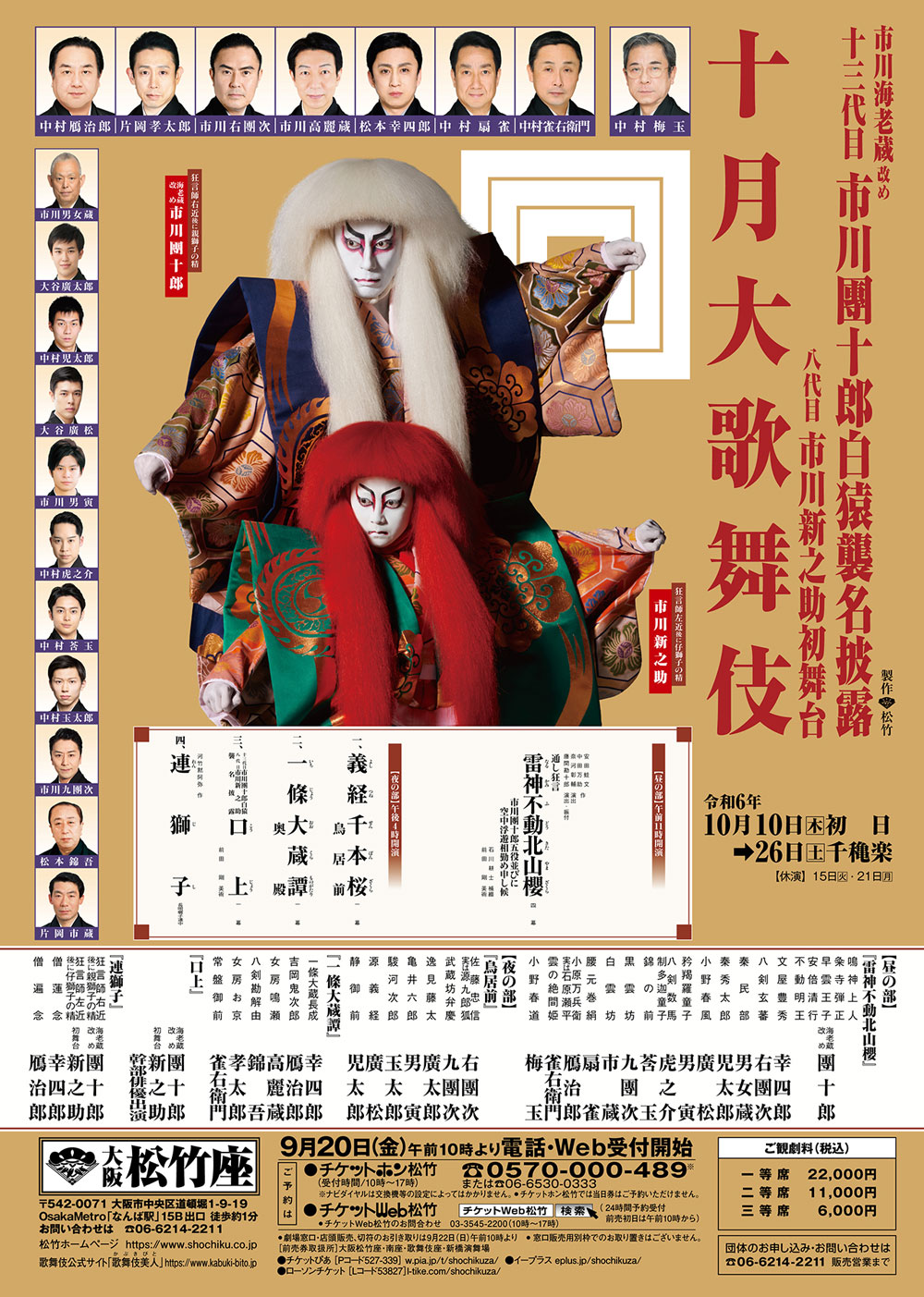Osaka Shochikuza Theatre
October Program at the Osaka Shochikuza Theatre
Daily: Oct 10 (Thu) - Oct 26 (Sat), 2024
Matinee:11:00 AM
Evening Show: 4:00 PM
*No performances on the 15th (Tue) and 21st (Mon).
Ichikawa Danjūrō XIII, Hakuen to appear at the Osaka Dotonbori for his Name Succession Event “DOTONBORI NIRAMI”(May 22)
On sale: from Sep 20 (Fri), 2024 10:00 AM(JST)
Ticket Price
First Class Seat: 22,000 /Second Class Seat: 11,000 /Third Class Seat: 6,000
Unit: Japanese Yen (tax included)
*Children over the age of 4 must purchase tickets to enter.
Osaka Shochikuza Theatre (at OSAKA) Theatre Information
- *No English supporting guide available.
- *Tickets for dates shown as "Sold Out" or for other preferred seating areas, may still be available from the promoter, Shochiku Co., Ltd. Please confirm the availability by phone or stop by the Box Office.
*Sold program (Detailed English synopsis are found at the end of the Japanese program) available.
This will be the last of the performances celebrating 'the name succession of Ichikawa Danjūrō XIII and the stage debut of Ichikawa Shinnosuke VIII' which have been taking place for 2 years since November 2022 at the Kabukiza Theatre.
In the Matinee, you will see various techniques typical of kabuki, such as the dynamic 'aragoto' acting style, quick changes of roles, a flight through the air, etc.
In the Evening Show, you can enjoy a masterpiece of the history play genre that includes many highlights, followed by a stage announcement featuring actors commemorating the name succession, and a popular kabuki dance, in which a parent lion with a white mane and its lion cub with a red mane swing their wigs around in a spectacular fashion.
 Osaka Shochikuza Theatre Stage Photo
Osaka Shochikuza Theatre Stage Photo
11:00 AM - 12:20 PM
(Intermission: 30 minutes)
12:50 PM - 2:15 PM
NARUKAMI FUDŌ KITAYAMA ZAKURA
['Saint Narukami and the Deity Fudō']
CAST :
- Narukami, a high priest
Kumedera Danjō, Toyohide's retainer
Prince Hayakumo
Abe no Kiyoyuki
Fudō Myō'ō, a Buddhist deity
Ichikawa Danjūrō XIII, changing his name from Ichikawa Ebizō XI- Bun'ya no Toyohide
- Matsumoto Kōshirō
- Yatsurugi Genba
- Ichikawa Udanji
- Hata no Minbu
- Ichikawa Omezō
- Hata Hidetarō
- Nakamura Kotarō
- Makiginu, a lady-in-waiting
- Nakamura Senjaku
- Ohara no Manbē, in reality, Ishihara Sehei
- Nakamura Ganjirō
- Princess Kumonotaema
- Nakamura Jakuemon
- Ono no Harumichi
- Nakamura Baigyoku
STORY :
'Narukami Fudō Kitayama Zakura' is a play incorporating the three works 'Kenuki', 'Narukami' and 'Fudō' which were some of the greatest hits of Danjūrō I and Danjūrō II. 'Kenuki' is about a wise samurai who acts as a detective to find out why a princess's hair mysteriously stands on end. He discovers the crucial clue when his metal whisker tweezers suddenly starts floating in mid-air. 'Narukami' is about a great priest who, angered by the emperor, imprisons the dragon god of rain in the pool beneath a nearby waterfall. This produces a drought throughout the land which causes great suffering for the people. A beautiful woman from the imperial court is sent to seduce the priest, and when he finds out that he has been tricked, his anger transforms him into a thunder god who vows to get his revenge. Finally, 'Fudō' is about the Buddhist deity of that name who is traditionally worshipped by the Danjūrō family of actors and the one to whom Danjūrō II attributed his success. In an impressive and spectacular tableau, the deity himself will appear on stage.
YOSHITSUNE SENBON ZAKURA
Torii Mae
['In Front of the Fushimi Inari Shrine' from 'Yoshitsune and the Thousand Cherry Trees']
CAST :
- Satō Tadanobu, in reality, the fox Genkurō
- Ichikawa Udanji
STORY :
Yoshitsune is forced to flee from the troops sent by his brother Yoritomo. As the journey will be hard, he decides he must leave behind his lover Shizuka Gozen. While Yoshitsune visits the nearby shrine, Shizuka is attacked by enemy men, but she is rescued by the timely arrival of Yoshitsune's retainer Tadanobu, who is actually a magical fox in disguise. The fox Tadanobu longs for the hand drum which is made from its parents' skins.
Intermission: 20 minutes
ICHIJŌ ŌKURA MONOGATARI
Okuden
['The Tale of Ichijō Ōkura']
CAST :
- Ichijō Ōkura Naganari, a lord
- Matsumoto Kōshirō
- Yoshioka Kijirō
- Nakamura Ganjirō
- Okyō, Kijirō's wife
- Kataoka Takatarō
- Tokiwa Gozen, Naganari's wife
- Nakamura Jakuemon
STORY :
This is a 'jidaimono' history play set in the 12th century. The Genji retainer Kijirō and his wife Okyō believed that Lady Tokiwa, the widow of the Genji leader Yoshitomo, had given up on her clan's struggle against the enemy Heike, but they rejoice to find that she secretly prays for the Heike's downfall. Yatsurugi Kageyu, one of the retainers of her current husband, the aristocrat Ōkura, discovers this. When he declares that he will tell Kiyomori about Lady Tokiwa's secret, he is killed by Ōkura. Though Ōkura seems to be nothing more than a fool, this is actually an elaborate disguise to hide his loyalty to the Genji clan and to survive in this turbulent world.
Intermission: 30 minutes
Shūmei Hirō KŌJŌ
['Stage Announcement Commemorating the Name Succession']
CAST :
Ichikawa Danjūrō XIII, changing his name from Ichikawa Ebizō XI
Ichikawa Shinnosuke VIII, making his stage debut
And other top-ranking actors are present
STORY :
The actors will appear as themselves to make a stage announcement to commemorate the name succession.
Intermission: 25 minutes
RENJISHI
['Parent and Child Lion Dance']
CAST :
- The actor Ukon, later, the spirit of the parent lion
- Ichikawa Danjūrō XIII, changing his name from Ichikawa Ebizō XI
- The actor Sakon, later, the spirit of the lion cub
- Ichikawa Shinnosuke VIII, making his srage debut
- Rennen, a priest of the Nichiren Sect
- Matsumoto Kōshirō
- Hennen, a priest of the Pure Land Sect
- Nakamura Ganjirō
STORY :
This is a dance adapted from a tale featuring the legendary 'shishi', a mythical lion-like beast. It is based on the belief that a 'shishi' will push its cubs over a steep cliff as a test of their strength, only nurturing those cubs strong enough to climb up by themselves. Two entertainers dance the tale of the legendary 'shishi' that live at the foot of a holy Buddhist mountain. The dance portrays a parent 'shishi' forcing its cub to undergo harsh training in order to grow up strong. In the finale, the 'shishi' themselves appear and perform their dance with the wild shaking of their long manes.


